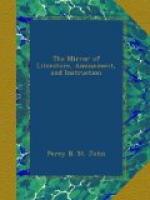Towards the month of November a Hydriote brig of war, commanded by the nephew of the brave Criezy, sailed to Cephalonia to take him on board, and bring him to Missolonghi; but the Septinsular government, not permitting ships bearing a Greek flag to come into its harbours, Byron was obliged to pass to Zante in a small vessel, and to join the Greek brig afterwards, which was waiting for him near Zante. Hardly was Byron on board when he kissed the mainmast, calling it “sacred wood.” The ship’s crew astonished at this whimsical behaviour, regarded him in silence; suddenly Byron turned towards the captain and the sailors, whom he embraced with tears, and said to them, “It is by this wood that you will consolidate your independence.” At these words the sailors, moved with enthusiasm, regarded him with admiration. Byron soon reached Missolonghi: the members of the Administrative Council received him at the head of two thousand soldiers drawn up in order. The artillery of the place, and the discharge of musquetry announced the happy arrival of this great man. All the inhabitants ran to the shore, and welcomed him with acclamations. As soon as he had entered the town, he went to the hotel of the Administrative Council, where he was complimented by Porphyrios, Archbishop of Arta, Lepanto and Etolia, accompanied by all his clergy. The first words of Byron were, “Where is the brother of the modern Leonidas?” Constantine Botzaris, a young man, tall and well made, immediately stepped forward, and Byron thus accosted him:—“Happy mortal! Thou art the brother of a hero, whose name will never be effaced in the lapse of ages!” Then perceiving a great crowd assembled under the windows of the hotel, he advanced towards the casement, and said, “Hellenes! you see amongst you an Englishman who has never ceased to study Greece in her antiquity, and to think of her in her modern state; an Englishman who has always invoked by his vows that liberty, for which you are now making so many heroic efforts. I am grateful for the sentiments which you testify towards me; in a short time you will see me in the middle of your phalanxes, to conquer or perish with you.” A month afterwards the government sent him a deputation, charged to offer him a sword and the patent of Greek citizenship; at the same time the town of Missolonghi inscribed him in its archives. For this public act they prepared a solemn ceremony for him; they fixed beforehand the day—they invited there by circular letters the inhabitants of the neighbouring districts—and more than twenty thousand persons arrived at Missolonghi. Byron in a Greek costume, preceded and followed by all the military, who loved him, proceeded to the church, where the Archbishop Porphyrios and the bishop of Rogon, Joseph, that martyr of religion and his country, received him in the vestibule of the church, clothed in their sacerdotal habits; and, after having celebrated mass, they offered him the sword and the patent of citizenship. Byron demanded that the sword should be first dedicated on the tomb of Marco Botzaris; and immediately the whole retinue, and an immense crowd, went out of the church to the tomb of that warrior, which had been ornamented with beautiful marble at the expense of the poet.




